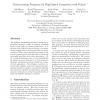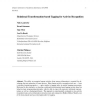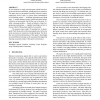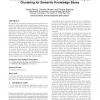25 search results - page 4 / 5 » Inductive Logic Programming for Symbol Recognition |
101
Voted
ICS
1995
Tsinghua U.
15 years 6 months ago
1995
Tsinghua U.
The elimination of induction variables and the parallelization of reductions in FORTRAN programs have been shown to be integral to performance improvement on parallel computers 7,...
111
Voted
ICPP
1996
IEEE
15 years 7 months ago
1996
IEEE
The ability to automatically parallelize standard programming languages results in program portability across a wide range of machine architectures. It is the goal of the Polaris ...
136
Voted
FUIN
2008
15 years 2 months ago
2008
Abstract. The ability to recognize human activities from sensory information is essential for developing the next generation of smart devices. Many human activity recognition tasks...
123
Voted
ICMLA
2007
15 years 4 months ago
2007
In our research we study rational agents which learn how to choose the best conditional, partial plan in any situation. The agent uses an incomplete symbolic inference engine, emp...
130
click to vote
CIKM
2007
Springer
15 years 9 months ago
2007
Springer
We present an evolutionary clustering method which can be applied to multi-relational knowledge bases storing resource annotations expressed in the standard languages for the Sema...




